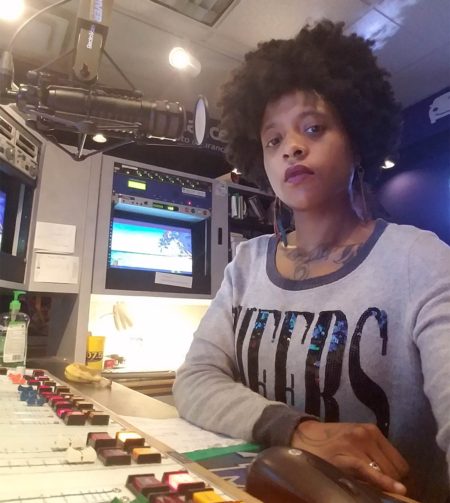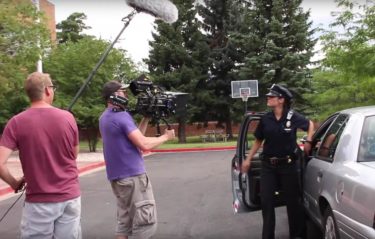Please fill out the following information, and RRFC Admissions will contact you to discuss our program offerings:
Issue #151
by L. Swift and Jeff McQ
 Since we featured Recording Connection grad Desiree Holiday in this newsletter back in July, it seems she hasn’t missed a beat, continuing to build her career in Nashville, Tennessee by pursuing her passions. Recently, her go-getter attitude paid off with a job as a producer and board operator at iHeart Radio!
While Desiree’s focus at RRFC was in audio rather than broadcasting, she’s found her audio skills lend themselves well to the radio business. “I monitor the broadcast of local college sports,” she says. “Early in the year, I’ll be doing more stuff, projects, as far as actual audio work and using Adobe.”
According to Desiree, landing the job at iHeart was a classic case of working connections until the job came about.
“I’ve made a lot of connections in Nashville,” she explains, “so I asked a friend of mine…I just asked her out of the blue, ‘Do you know anyone in radio or in audio that needs help?’ And she said she knew a guy… She basically hooked me up with him, and he worked there at the radio station at iHeart with 1510 WLAC. So working with him on his podcast, I helped produce it as far as making interviews, editing audio, and I’m doing a lot with him on that. And so from there, he kept his ear to the ground for me, and just let me know, ‘Hey, they have an opening here, such-and-such, you ought to apply for.’…Just being in that environment, having been able to meet the manager, just working with him and being at the right place kind of allowed them, when they got my resume, to put a familiar face to it. I applied, and they got me in for the interview and that basically got me the job… So it was just really knowing people and doing good work with the podcast I’ve been working on since August.”
That’s not all Desiree has going on. Among her other projects, she’s working on restoring some audio for a rap artist and recently, she even got the opportunity to do Foley work on an animated short film! Desiree also drops hints of a huge, hush-hush project in the works with her former mentor, Ric Web of South Street Studios. “We can’t say too much about it because we’re all under an NDA,” she says, “but I’m excited for it…I can’t wait to share more details.”
Interestingly enough, with all the connections she’s worked on, and the resulting successes, Desiree admits that the process of networking doesn’t come naturally to her.
“Discomfort breeds success,” she says. “I don’t consider myself a social person at all. I’m a true introvert…I had to tell myself, like, don’t be afraid of people. You know, you got to be willing to meet new people and make new relationships no matter how uncomfortable you might feel…I had to learn the art of small talk, and through small talk, I’ve gotten to meet so many people and just make different connections.”
What is the art of small talk? “Start with simple questions,” Desiree explains. “‘Where are you from?’ ‘How many kids do you have?’ ‘Where did you go to school?’ I start with simple questions that anyone wouldn’t feel uncomfortable answering if you’re in that environment, you know? And then they give you an answer, and then you find something in that answer to ask another question about… and from there you build on the conversation until you get to the point you’re looking for.”
For Desiree, overcoming her own shyness with the art of small talk has led to many of her connections, and ultimately multiple jobs, including the one at iHeart Radio. That, and her willingness to say yes to opportunities. She has this advice for students:
“Take all the experience you can,” she says. “You know, always give everything a try… give everything a shot. You just never know where that’s going to lead as far as getting work…That comes from getting out of your comfort zone, saying yes to things you normally wouldn’t say yes to. That’s how I got it.”
Since we featured Recording Connection grad Desiree Holiday in this newsletter back in July, it seems she hasn’t missed a beat, continuing to build her career in Nashville, Tennessee by pursuing her passions. Recently, her go-getter attitude paid off with a job as a producer and board operator at iHeart Radio!
While Desiree’s focus at RRFC was in audio rather than broadcasting, she’s found her audio skills lend themselves well to the radio business. “I monitor the broadcast of local college sports,” she says. “Early in the year, I’ll be doing more stuff, projects, as far as actual audio work and using Adobe.”
According to Desiree, landing the job at iHeart was a classic case of working connections until the job came about.
“I’ve made a lot of connections in Nashville,” she explains, “so I asked a friend of mine…I just asked her out of the blue, ‘Do you know anyone in radio or in audio that needs help?’ And she said she knew a guy… She basically hooked me up with him, and he worked there at the radio station at iHeart with 1510 WLAC. So working with him on his podcast, I helped produce it as far as making interviews, editing audio, and I’m doing a lot with him on that. And so from there, he kept his ear to the ground for me, and just let me know, ‘Hey, they have an opening here, such-and-such, you ought to apply for.’…Just being in that environment, having been able to meet the manager, just working with him and being at the right place kind of allowed them, when they got my resume, to put a familiar face to it. I applied, and they got me in for the interview and that basically got me the job… So it was just really knowing people and doing good work with the podcast I’ve been working on since August.”
That’s not all Desiree has going on. Among her other projects, she’s working on restoring some audio for a rap artist and recently, she even got the opportunity to do Foley work on an animated short film! Desiree also drops hints of a huge, hush-hush project in the works with her former mentor, Ric Web of South Street Studios. “We can’t say too much about it because we’re all under an NDA,” she says, “but I’m excited for it…I can’t wait to share more details.”
Interestingly enough, with all the connections she’s worked on, and the resulting successes, Desiree admits that the process of networking doesn’t come naturally to her.
“Discomfort breeds success,” she says. “I don’t consider myself a social person at all. I’m a true introvert…I had to tell myself, like, don’t be afraid of people. You know, you got to be willing to meet new people and make new relationships no matter how uncomfortable you might feel…I had to learn the art of small talk, and through small talk, I’ve gotten to meet so many people and just make different connections.”
What is the art of small talk? “Start with simple questions,” Desiree explains. “‘Where are you from?’ ‘How many kids do you have?’ ‘Where did you go to school?’ I start with simple questions that anyone wouldn’t feel uncomfortable answering if you’re in that environment, you know? And then they give you an answer, and then you find something in that answer to ask another question about… and from there you build on the conversation until you get to the point you’re looking for.”
For Desiree, overcoming her own shyness with the art of small talk has led to many of her connections, and ultimately multiple jobs, including the one at iHeart Radio. That, and her willingness to say yes to opportunities. She has this advice for students:
“Take all the experience you can,” she says. “You know, always give everything a try… give everything a shot. You just never know where that’s going to lead as far as getting work…That comes from getting out of your comfort zone, saying yes to things you normally wouldn’t say yes to. That’s how I got it.”
 It’s not often talked about among creative artists and producers, but there is an important business element to the music industry without which these artists, producers and engineers would have no platform to reach their audience. Many people who dream of a music industry career are at least aware of the business side, but they know little about it, let alone the career potential within it.
Well, that’s all about to change. RRFC is pleased to announce our new Music Business Program, complete with an all-new curriculum written by one of the music industry’s top players, Ashley Calhoun!
As manager for Grammy-winning producer Rahki—himself one of Recording Connection’s most coveted mentors—Ashley recently agreed to write a curriculum specifically geared to the current needs of up-and-coming music business professionals. In the interview below, Ashley talks about how the curriculum came about, what it covers, and the types of career options for which it can prepare you!
It’s not often talked about among creative artists and producers, but there is an important business element to the music industry without which these artists, producers and engineers would have no platform to reach their audience. Many people who dream of a music industry career are at least aware of the business side, but they know little about it, let alone the career potential within it.
Well, that’s all about to change. RRFC is pleased to announce our new Music Business Program, complete with an all-new curriculum written by one of the music industry’s top players, Ashley Calhoun!
As manager for Grammy-winning producer Rahki—himself one of Recording Connection’s most coveted mentors—Ashley recently agreed to write a curriculum specifically geared to the current needs of up-and-coming music business professionals. In the interview below, Ashley talks about how the curriculum came about, what it covers, and the types of career options for which it can prepare you!

Recording Connection students Grainger Weston, Zach Kattawar and mentor Jeramy Roberts
 Thanks to her mentor Johny Fischer, Film Connection student Leticia Rodriguez (Denver, CO) recently got the chance to shoot BTS footage for a comedic short during the 48 Hour Film Project. Leticia says, “It ended up being a good size crew made up of Blair’s team and several of us students from Film Connection… It never fails to impress me how a bunch of strangers can come together and work professionally to produce a film…The Film Connection group were enthusiastic and eager to lend a hand… It was long day but a fun one. I enjoyed working with everyone and would love an opportunity to do it all over again. If it hadn’t been for Film Connection I wouldn’t have been there. I look forward to many more film projects in 2017!” View full BTS video.
Thanks to her mentor Johny Fischer, Film Connection student Leticia Rodriguez (Denver, CO) recently got the chance to shoot BTS footage for a comedic short during the 48 Hour Film Project. Leticia says, “It ended up being a good size crew made up of Blair’s team and several of us students from Film Connection… It never fails to impress me how a bunch of strangers can come together and work professionally to produce a film…The Film Connection group were enthusiastic and eager to lend a hand… It was long day but a fun one. I enjoyed working with everyone and would love an opportunity to do it all over again. If it hadn’t been for Film Connection I wouldn’t have been there. I look forward to many more film projects in 2017!” View full BTS video.

RRFC is education upgraded for the 21st century.
Get the latest career advice, insider production tips, and more!
Please fill out the following information, and RRFC Admissions will contact you to discuss our program offerings:
Stay in the Loop: Subscribe for RRFC news & updates!
© 2025 Recording Radio Film Connection & CASA Schools. All Rights Reserved.


